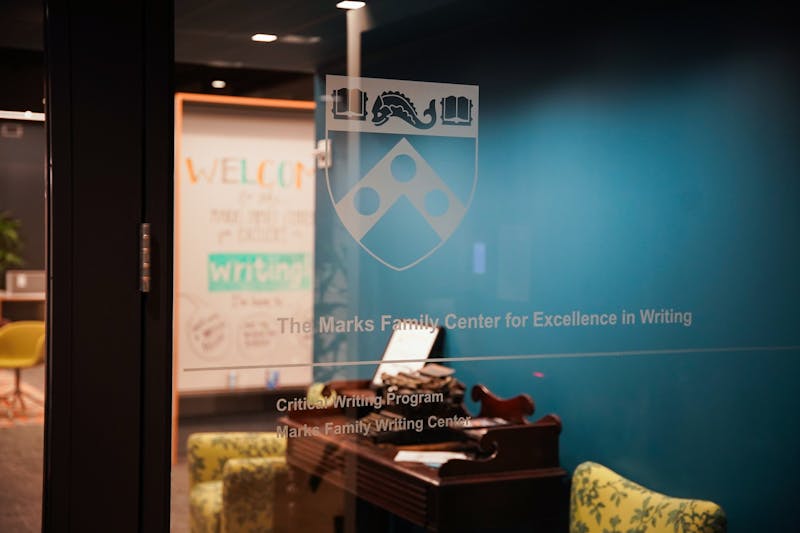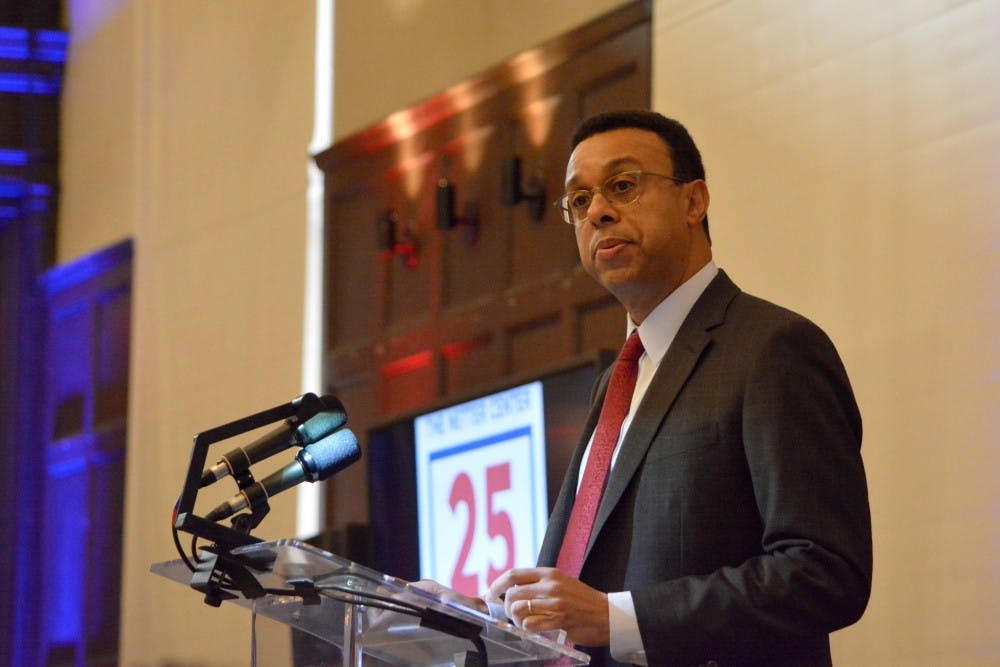
The Penn Professional Staff Assembly sponsored a talk with Penn Provost Wendell Pritchett on Jan. 30. Roughly 50 staff members gathered in Claudia Cohen Hall to hear Pritchett discuss a variety of topics that he chose, from his personal background to University initiatives in the broader Philadelphia area.
The provost then opened the floor up to questions from the staff members present, and they asked him about topics ranging from the reporting of sexual assault on campus to the search for a new vice provost and director of libraries.
Trump's announcement to end the Deferred Action for Child Arrivals program struck Penn and many of its Dreamers on campus at various points since September. The most recent immigration plan paves a path for Dreamers to obtain citizenship, but the plan's crackdown on border security and immigration policy leaves many at Penn uncertain of the plan's benefits and of its likelihood even to pass. DACA is still of grave concern to many staff at Penn as well.
As a decentralized university, Penn's process of reporting sexual assault can be complex and difficult to navigate. At a time when sexual misconduct allegations have breached public attention, including most recently of former trustee and major Penn donor Steve Wynn, students at Penn have become increasingly vocal as well.
Staff members also raised issues concerning the search to replace Vice Provost and Director of Libraries Carton Rogers, who will be retiring at the end of this semester after 42 years. Mental health, too, is always front of mind for many at Penn, which recently rolled out a series of initiatives to combat mental health on campus, such as the launch of the wellness website; the addition of five staff at Counseling and Psychological Services; and an overview of operations at CAPS, which has been scrutinized for its high wait times and lack of a streamlined referral process.
Here are some of the questions staff asked at the event: The transcript has been edited for clarity.
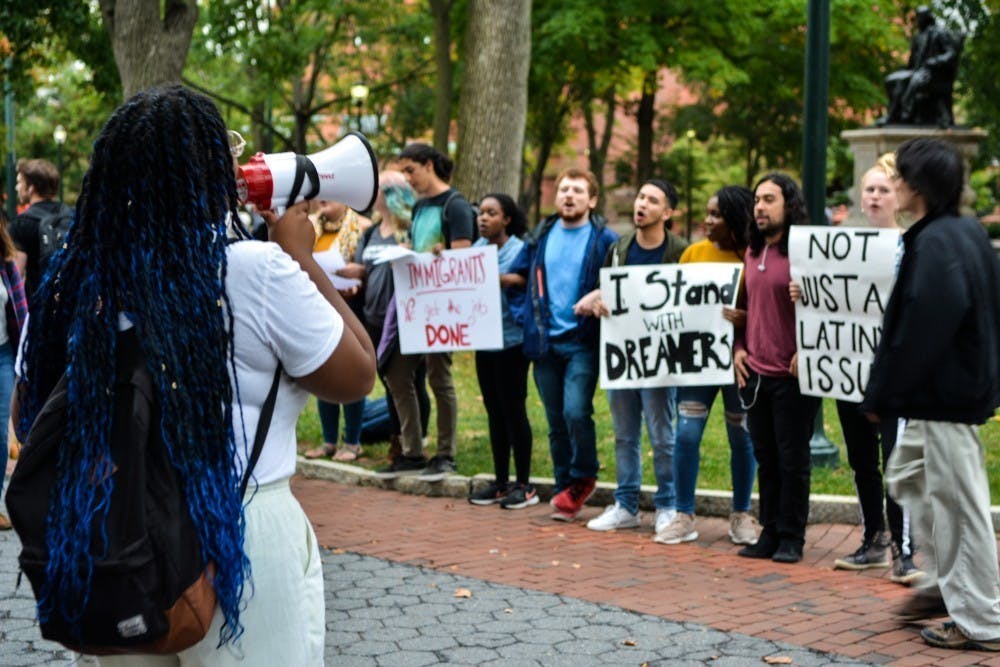
Staff Question: What are we currently doing to protect our DACA students and with the upcoming legislation, what will we be doing if things don’t go the way we hope they will?
Pritchett: Thank you for asking that. Let me start by saying, and the president and I reinforced this in a message to the whole community in the fall, we will do everything to support our DACA students and also everything that we can within the limits understanding of a nonprofit institution lobbying. But everything that we can to advocate on behalf of unDACAmented people all across the country.
Your question was more specifically what we’re doing for our community, and so there’s a specific thing I want to make sure that everybody knows, at the Law School where I am in appointment, we have what is called a Transnational Law Clinic. I could give you the reason why it’s called the Transnational Law Clinic: they are, among their priorities, the point place for any legal issues or any legal advice applications that our DACA — particularly students, but also others in our community need. So if you know somebody who needs some help: One, send them to transnational law firm. Two: send them to our website. So we have —DACA at Penn —we have a website which has a list of resources. Among the most important of which is the transnational law clinic.
The second part of your question is what do we do in this crazy political world if where the Congress says it wants to go, and it doesn’t get there, which is sad, because they say there’s agreement but we can’t get there.
To be honest with you, I don’t know what we will do in March slash whenever if we don’t get the resolution that we want. A couple things on that — one, the Trump administration’s efforts in this area actually have been enjoined, so right now March is not a deadline. Advocates have actually won in district court enjoining the administration from implementing what they want to do, so actually we don’t have a March deadline anymore. When the deadline is, I don’t know.
But I will say again, we are also keeping in close touch with all of the people that we know who are affected by this and again I want to urge you that the people that you know, because some people are reluctant to come forward, but make sure that people that you know know what the resources are, and there are lots of ways we can handle confidentiality. So please encourage people, and if they’re worried, they should again go to the website, and they should also contact the Transnational Law Clinic at the Law School.
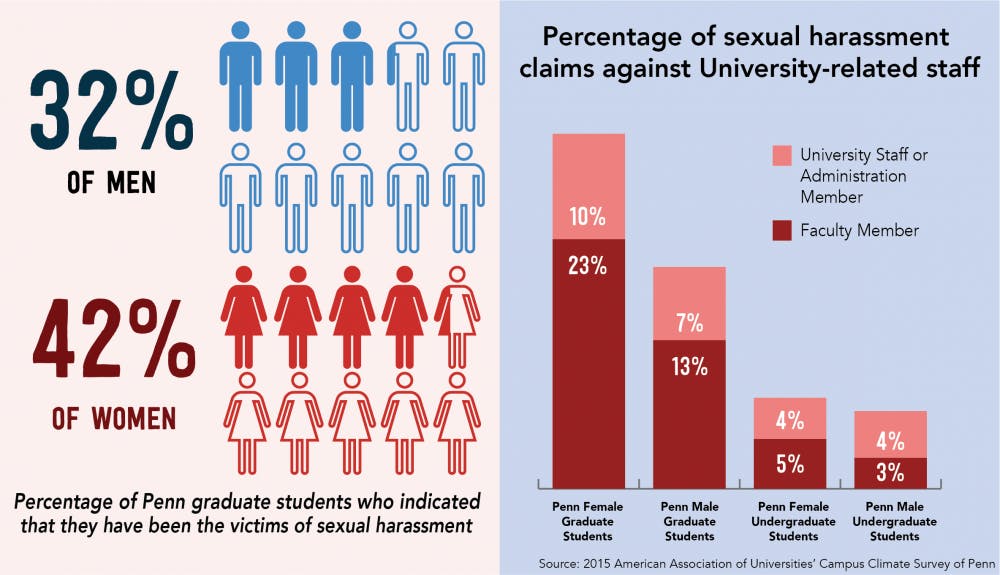
Staff Question: There was a talk in this room a couple months ago with the General Counsel that left a lot of us troubled, because one of the questions stemmed from, if a student is coming forward — or if anyone’s coming forward, like a faculty member —they’re supposed to go to the dean’s office and the answer to the question. The General Counsel climate kept deflecting to go to the dean’s office, students aren’t necessarily comfortable going to the dean’s generally anyway, and so for that kind of matter is even more troubling. So the question I asked the General Counsel was, I’m trying to be an advocate, figure out my voice in the situation, if there were any dean’s office members in the room, and there were none. So that was kind of troubling, so I just wanted to ask if you have any goals in that direction, to try to get dean’s office more involved in Penn Violence Prevention, or potentially letting the advocates and the people that show up to the Penn Violence Prevention meetings do the work that they’re good at doing and advocating for students when they have issues about sexual assault.
Pritchett: It’s a really important issue, I’m glad you raised it here, I’m glad you’ve been talking about it and thinking about it. I’ll start with a positive, and then go on […]. I do think that we have spent a lot of time with regards to sexual harassment and sexual violence policies. We gave it a lot of attention when I was in the Law School, I participated in a lot of conversations about that. Since then, we have pretty much been constantly reassessing both our policies and procedures, so while we do have procedures that are clear now that I’ll articulate even though I think you know them. This is an area where we’re constantly reassessing, and I've got to tell you, on a literal daily basis. I had conversations this week, today, with college deans and others about are we really doing as much as we can to support our students and faculty and staff in this area. One example of that, this is specifically in regards to faculty — we did just yesterday disseminate a new video for faculty to give them an update on what our expectations and requirements are with regards to sexual harassment and sexual violence, and what they should do if they are aware. That was specifically focused to faculty, which is why it was sent to faculty, but we’re continually thinking about other videos and other kinds of ways to disseminate the policies that we already have and get people thinking about it.
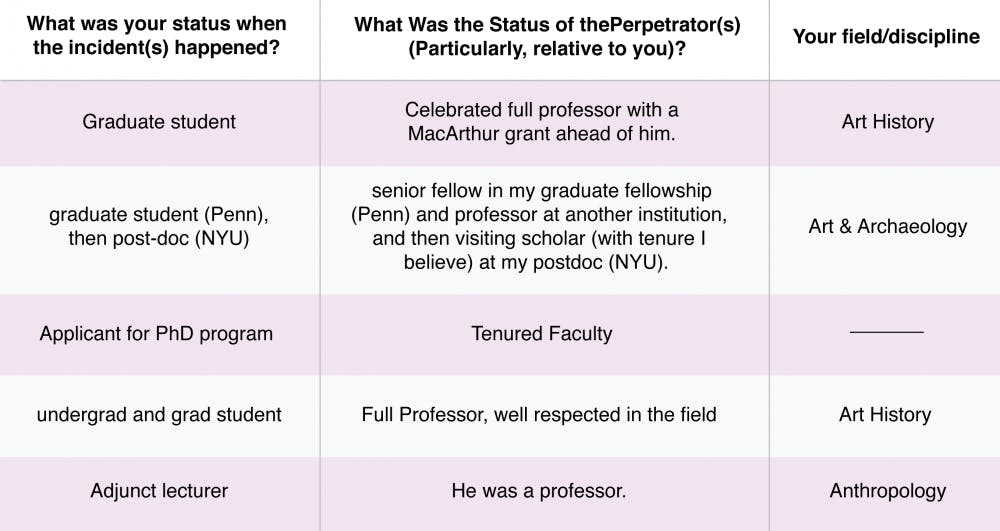
With regard to actual investigations in sexual violence, you know this is a very large university, and so we’ve taken the approach that this work should happen in the schools where students are located. Students think about themselves as students at the University of Pennsylvania, but most students are focused more significantly on Wharton, they think about Engineering, they think about the Law School, and so we're trying to provide services and supports closer to where the students are. That said, two things to kind of wrap up my long process of this issue. One, you are exactly right that the dean’s office and other supports for the students need to be as robust as possible, they need to be aware and we need to train them, the resources that the University has, to do that. We are in the process of doing more of that training.
And also, I will confess to you, this is a challenge for a provost of a large decentralized university, I do think we have to continue to think about what is the right relationship between our central organizations like Sexual Violence [Investigative Officer] and Penn Violence Prevention, which are university offices, and the schools. And so while we have a relatively clear structure right now, which again starts in the schools, that doesn't that mean we are going to keep it exactly the way we have it right now are. I guess I will conclude with saying one more thing about your question two, continue to push and make recommendations.
And I guess the last thing that I want to say is that as a lawyer who spends a lot of time studying structures and thinking about structures and implementing structures, the core thought should be that everybody understands that sexual violence and sexual harassment are unacceptable, and everybody should know that we are going to enforce the rules that say they’re unacceptable and that everybody in this room and everybody else should convey that to everybody in our community. That if you experience some incident, then you need to, please do report it, whoever that person is to report it to, and that we will support you.
And I guess the last thing that I’ll say, and I know you feel this way, and I see other people nodding, I think that we are experiencing a seat change, and many good ones, and so I would urge each one of you if you know somebody, help them, take them to that person. If a person feels uncomfortable in the dean’s office, well they’re gonna feel less uncomfortable if a friend goes with them. I don’t want to say that this isn’t the central provost’s responsibility, which it is, but it’s another thing that’s all of our responsibilities. Each one of us has to step up, for lack of a better phrase, because that’s the only way we’re going to have a cultural change.
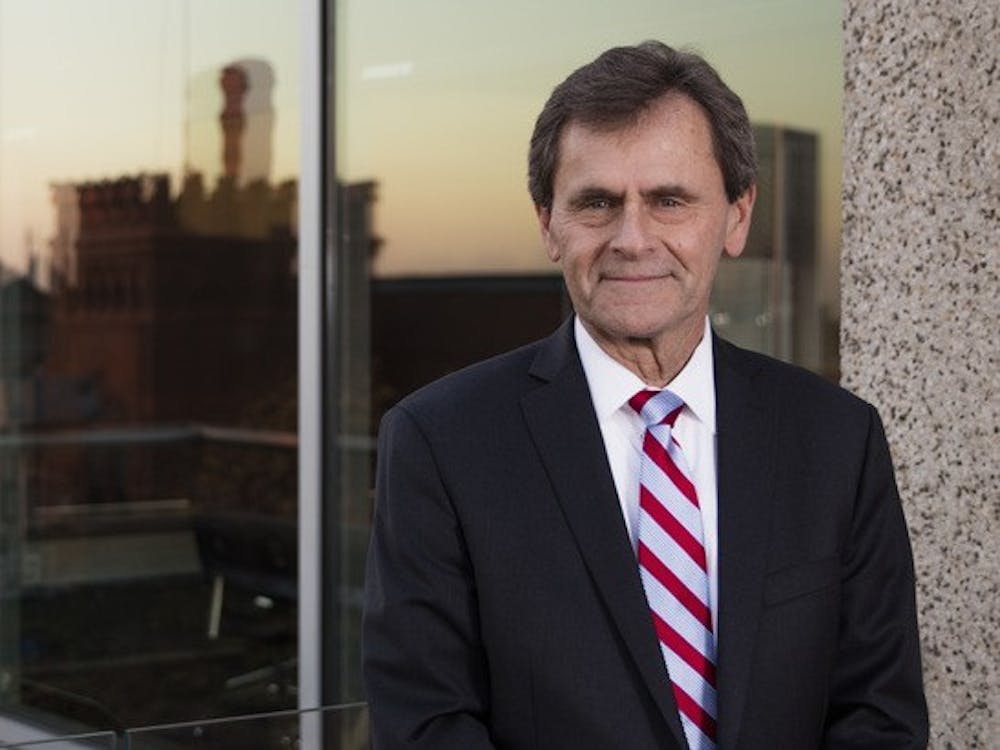
Photo from Jodie Masotta
Staff Question: As you know, our Vice Provost and Director of Libraries is retiring, and I was wondering if you had any vision for this position, filling it.
Pritchett: I’d love to clone Carton, that would be wonderful. How do we replace Carton? It would be wonderful to clone him because he’s amazing. Now I know that’s not realistic, because we haven’t figured that out yet. But the bigger answer to your question is, we’re looking for somebody like Carton who can do so many things.
One, someone who can run and supervise a complex library system, but be a terrific university partner with so many different places. I mentioned the museum, and the Director of the museum, Julian Siggers, who is on the search committee who is looking for Carton’s replacement, and he talks just so eloquently about all the great work that the museum and the library do together, and that’s just one of a hundred examples. So we’re looking for somebody who’s going to really collaborative. You know, again, how do we can clone Carton, because he’s superhuman.
In addition, he’s been able to renovate so many of our facilities and raise money to do that. Finally, somebody who's really technically savvy, and can think about all the new ways that information can be provided, and so that’s a gigantic task. I don’t think Carton is fully replaceable, but at the same time we know that well, there is a Carton, so there hopefully are other people like him. And actually, that search process is starting, and I’m confident because we have an amazing institution that we’re gonna find a really good person. It’s a big challenge, because he’s one of the jewels of our institution.
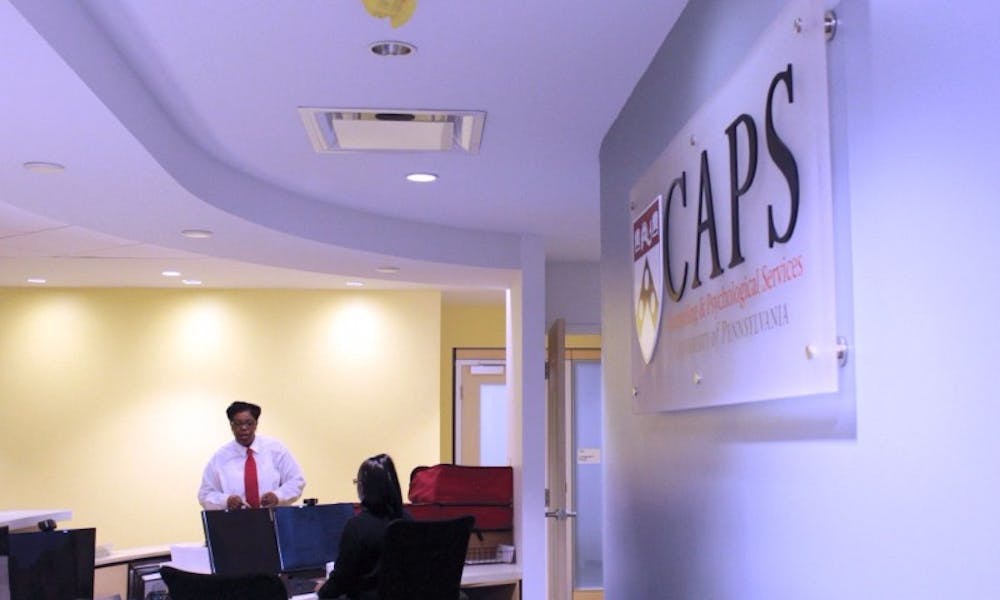
File Photo
Staff Question: Is there anything else that you see that could be done to kind of alleviate pressure on students and make them succeed nevertheless?
Pritchett: There’s nothing more important, in my opinion, in my job, than making sure students feel supported [...].Now that said, I want to come back to something. Again, I think it’s important for leaders and everyone to look for the positive, because one that helps you be successful, but also it’s the positive that helps you figure out what works so that you can replicate it. So I just want to say, and again I think it’s something and I say whenever I’m asked this question, we do have a positive climate. This is a place where we have 25,000 students, but they are doing amazing. And I interact with them, fortunately, on a daily basis, and most of my interactions with them are, “I’m doing this great thing. I’m going to Quito, Ecuador for this semester, I’m doing some work in southwest Philadelphia.” That’s what they’re talking about, and they’re excited about what they’re doing. Again, I don’t want to downplay the challenges we have [...].
One of the many amazing things we have here is the Center for Positive Psychology, the framework of positive psychology was created at Penn, which has influenced our thinking around the world. And the leaders of the Center for Positive Psychology say that I should do what I just, say that we should do what I just did. The way that we can create a positive climate is by talking about a positive climate. I just want to convey that before I now talk about some of the things that we’re doing to help students who have real challenges
One, and I’ll start with students who are in crisis. The President and I announced additional resources at Counseling and Psychological Services, which we are going to be implementing in the spring. We are in the process of adding an evaluation of the organization staffing and the operations of Counseling and Psychological Services. They already reported a lot of good ideas about ways that we could continue to improve the great work that they already do over there and help students access the great resources that they have over there. So that’s for students in crisis.
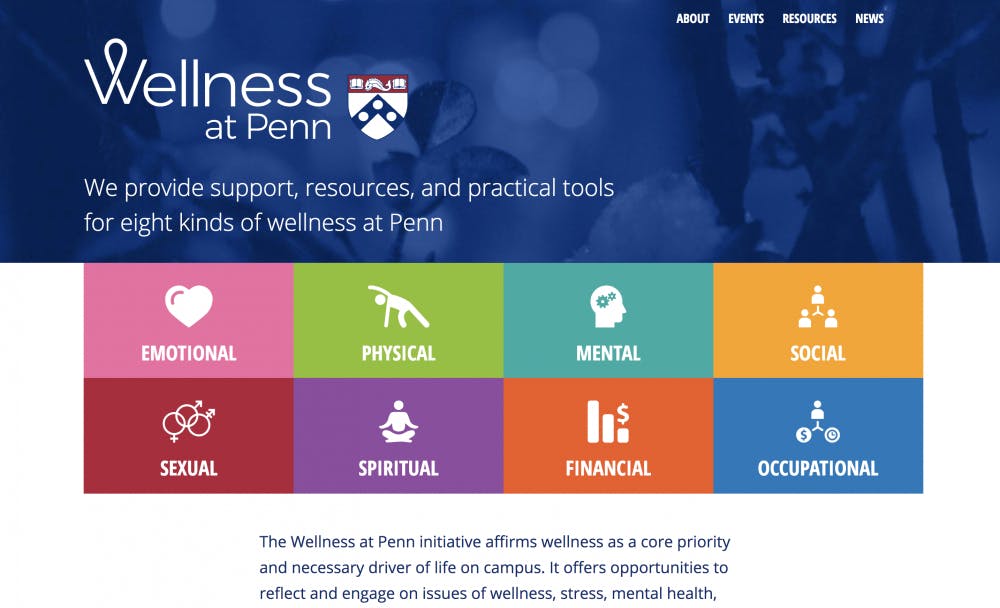
Screenshot / University of Pennsylvania
We also, and I hope you saw this message to the community just last week, rolled out a Campaign for Wellness and a wellness website which brings together all the different resources that we have on campus so that people have one place that they can go[...]. And that’s everything from talking about CAPS to things like university-wide yoga, which I understand that we had on Friday, did anybody go? So I had it in my schedule, and I couldn’t go because my daughter had to have her wisdom teeth out.
The answer is we have to do all of these things. So it’s not just about things like CAPS. It’s about creating structures and a climate on campus that is positive. Are there other things that we can do? Yeah, we’re even thinking about things like, "Oh, are there academic changes to programs that we need to take? Are there things that we need to think about in regards to grading?"
The students are thinking about it also. The student leaders think that their culture because we have this multiplicity of student groups. And student groups were supposed to be outlets for enjoyment, but they’ve actually become competitive too. And their focus is on what we can do about that.
And I guess the last thing I’ll say, which kind of circles back to the first thing I said, is this is another area where it’s the Provost’s responsibility and the President’s responsibility to lead the University, but we all have to help. Culture is not created by the top; culture is created by everyone. And so I’m committed, and I know the president is committed, to continue to build that. But it was so heartening to me when I met with the student leadership at the beginning of the academic year, they said that this was their priority too. Because that’s how we’re gonna make more problems. And so I think a lot of my job is supporting the work that they want to do, because I think that’s how we’re really going to succeed."
The Daily Pennsylvanian is an independent, student-run newspaper. Please consider making a donation to support the coverage that shapes the University. Your generosity ensures a future of strong journalism at Penn.
Donate






